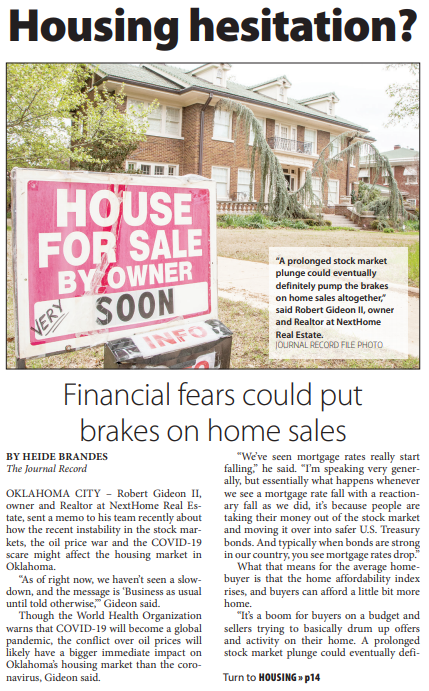By: Heide Brandes
Published: March 12, 2020
OKLAHOMA CITY – Robert Gideon II, owner and Realtor at NextHome Real Estate, sent a memo to his team recently about how the recent instability in the stock markets, the oil price war and the COVID-19 scare might affect the housing market in Oklahoma.
“As of right now, we haven’t seen a slowdown, and the message is ‘Business as usual until told otherwise,’” Gideon said.
Though the World Health Organization warns that COVID-19 will become a global pandemic, the conflict over oil prices will likely have a bigger immediate impact on Oklahoma’s housing market than the coronavirus, Gideon said.

“We’ve seen mortgage rates really start falling,” he said. “I’m speaking very generally, but essentially what happens whenever we see a mortgage rate fall with a reactionary fall as we did, it’s because people are taking their money out of the stock market and moving it over into safer U.S. Treasury bonds. And typically when bonds are strong in our country, you see mortgage rates drop.”
What that means for the average homebuyer is that the home affordability index rises, and buyers can afford a little bit more home.
“It’s a boom for buyers on a budget and sellers trying to basically drum up offers and activity on their home. A prolonged stock market plunge could eventually definitely pump the brakes on home sales altogether,” Gideon said. “Right now buyers are trying to decide whether or not they should jump while mortgage rates are this low. Low interest rates have a positive effect on affordability. I have spoken with a few lenders and agents outside of our office and they have not seen any slowdown as of yet and neither has our firm.”
However, when the market responds to events like a pandemic scare or the OPEC and Russian oil price war, the first housing markets to see a negative effect are the luxury markets, he said.
Economists the world over have difficulty projecting the market’s response to these major disruptors, especially in a politically charged election year, Gideon said.
“As far as the coronavirus, I’m already seeing people concerned about going to see houses and about letting people into their houses for open houses or showings,” said Gideon.
While it’s difficult to predict economic impacts with any certainty, real estate trends in China and the United States to date could provide indications of what to expect.
The Chinese economy is already seeing severe impacts on its real estate markets. As the second-largest economy in the world, China is responsible for 20% of global manufacturing output.
Many experts expect that the recent decline in China’s economy will have a substantial effect on worldwide manufacturing output.
It’s not all bad news, however.
National housing market indicators available as of February showed activity in housing markets improved overall. Trends in some of the top indicators for this month include purchases of new homes rebounding to the highest pace since July 2007.
New single-family home sales climbed 7.9% to 764,000 units in January from an upwardly revised pace of 708,000 in December and were 18.6% higher than one year ago.
Mortgage rates are less than a quarter-point above all-time lows. The 30-year fixed-rate mortgage reached an average weekly low in February of 3.45% for the weeks ending Feb. 6 and 27, down from January’s weekly low of 3.51% for the week ending Jan. 30. One year ago, the 30-year fixed-rate mortgage was 4.35%, according to the National Housing Market Indicators Monthly Report by the U.S. Department of Housing and Urban Development.
“Oklahoma City’s housing market has been strong for years. Oklahoma, in general, has been very insulated from some of the turbulence we’ve seen across the country, especially dating back to 2008,” Gideon said.
